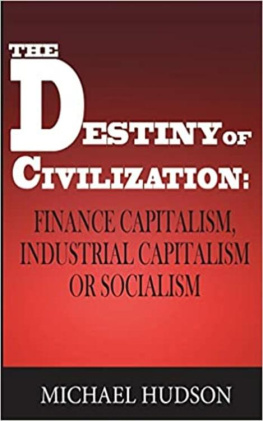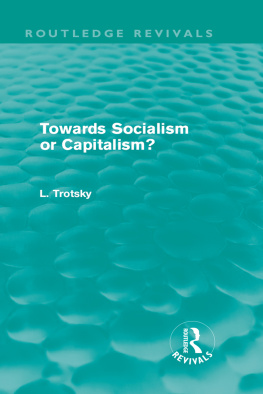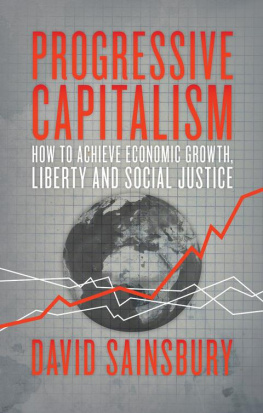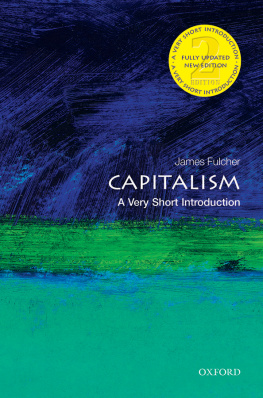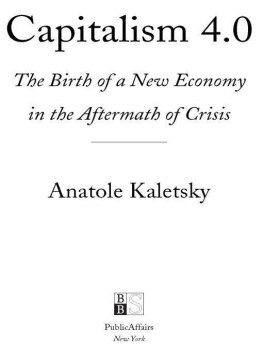WHY CAPITALISM?
WHY CAPITALISM?
ALLAN H. MELTZER


Oxford University Press, Inc., publishes works that further
Oxford Universitys objective of excellence
in research, scholarship, and education.
Oxford New York
Auckland Cape Town Dar es Salaam Hong Kong Karachi
Kuala Lumpur Madrid Melbourne Mexico City Nairobi
New Delhi Shanghai Taipei Toronto
With offices in
Argentina Austria Brazil Chile Czech Republic France Greece
Guatemala Hungary Italy Japan Poland Portugal Singapore
South Korea Switzerland Thailand Turkey Ukraine Vietnam
Copyright 2012 by Allan H. Meltzer
Published by Oxford University Press, Inc.
198 Madison Avenue, New York, New York 10016
www.oup.com
Oxford is a registered trademark of Oxford University Press
All rights reserved. No part of this publication may be reproduced,
stored in a retrieval system, or transmitted, in any form or by any means,
electronic, mechanical, photocopying, recording, or otherwise,
without the prior permission of Oxford University Press.
Library of Congress Cataloging-in-Publication Data
Meltzer, Allan H.
Why capitalism? / Allan H. Meltzer.
p. cm.
Includes bibliographical references and index.
ISBN 978-0-19-985957-3 (cloth : alk. paper) 1. Capitalism. I. Title.
HB501.M45 2012
330.122dc23 2011020507
9 8 7 6 5 4 3 2 1
Printed in the United States of America
on acid-free paper
I dedicate this book to my grandchildren
hoping that they will come to share my passion
for liberty.
CONTENTS
PREFACE
It was with a mixture of surprise and disbelief in the fall of 2008 that I read journalists commentaries on the end of capitalism. Many welcomed the expansion of regulation and government intervention and the weakening of market competition as a regulator. Several journalists asked me to comment on the alleged end of capitalism. Did they not see that capitalism had become the dominant form of economic organization that had spread in the past 50 years from a few countries in North America and Western Europe to Asia, Latin America, and now to Africa? I often wonder if they are pleased by the increase in regulation that coincides with sluggish growth and persistent high unemployment.
This book offers my explanation of the success of democratic capitalism and the failure of alternatives. Democratic capitalism has three unequaled strengths. It is the only system that achieves both economic growth and individual freedom, and it adapts to the many diverse cultures in the world. Adapting to cultures means that it works well with people as they are, not as someone would like to make them. Democracy works to remove the most common criticism of capitalismthat it generates inequality in income distribution. Voters choose the tax rates and income redistribution that satisfies a majority of voters, never all of them.
Alternatives to capitalism, whether socialism, communism, fascism, or some religious orthodoxies, offer some groups utopian vision of mankind that becomes the one right path. Utopian visions and orthodoxies always bring enforcement, often brutal enforcement. The 20th century saw many such outcomes. None achieved both higher living standards and greater individual freedom. National Socialism, Soviet and Chinese Communism instead produced mass murders of millions. This should have extinguished the appeal of utopian visions, but it has not. Many still believe that social justice can only be achieved by ending or severely regulating capitalism. These essays dispute that notion.
Long ago John Locke recognized that collective action is the efficient response to some social problems. Voters in democratic capitalist countries can vote to redistribute and regulate. Regulation restricts competitive solutions, but regulation often fails to achieve efficient or desirable outcomes because it is subject to capture by the regulated and to circumvention by those most affected. Regulation works best when it changes the incentives of the regulated. Much regulation, instead, creates incentives for circumvention and corruption.
Capitalism is not a perfect solution to human problems. Perfect solutions are utopian; capitalism is a human institution that works with humans as they are. I share the view strongly taken by early Christianity that Immanuel Kant expressed very well. People are not perfect; capitalism and all its many alternatives are not responsible for what goes wrong. People, most often people in powerful positions, are. Capitalism disperses and limits power while the alternatives concentrate power in a few hands.
The chapters that follow show the influence of Immanuel Kant, Karl Popper, Friedrich Hayek, Milton Friedman, and my former teachers and friends Karl Brunner and Armen Alchian. The path that I follow combines what I received from them, together with some that I added during a lifetime of teaching, learning, and writing scholarly publications. Work with my friend and former colleague Scott Richard has a prominent place in the development of ideas about democratic capitalism. I also owe a debt to the MBA students at Carnegie Mellons Tepper School, who for many years have elected my course on capitalism and commented on the materials, and to Lynn Chu, who read and edited the manuscript to make it more readable.
I have spent more than 50 years as a teacher and scholar, so I have accumulated many debts. My thanks to the many colleagues and friends who helped and encouraged me. Most of all, I am indebted to my wife, Marilyn, for her unflagging support and encouragement. Special thanks also to Richard Scaife and the Scaife Foundations and the Bradley Foundation for many years of support. My assistant, Alberta Ragan, has prepared my manuscripts and assisted ably in many projects with grace and excellence for more than 30 years. Thank you.
Pittsburgh, May 2011
WHY CAPITALISM?
1
WHY CAPITALISM?
OPPONENTS OF CAPITALISM and free markets frequently claim that one or another of the periodic crises that occur foreshadow the end of capitalism. Most recently, such predictions followed the recent financial crisis. The 2008 housing-credit crisis was a serious, but temporary, declinenot a permanent loss of wealth, much less the end of capitalism, as some proclaimed at the time. Capitalist systems have weathered many more serious problems and all survived this one.
Today, capitalism is the economic system that guides most of the worldhaving overcome unremitting intellectual hostility, as well as military hostility from Communist nations during the Cold War. Yet even China and formerly socialist India have embraced market economies. Both recently pledged to maintain them, along with South Korea and Australia.
Capitalist systems are not rigid, nor are they all the same. Capitalism is unique in permitting change and adaptation, so different societies tend to develop different rules and processes, often reflecting cultural requirements. What all share is ownership of the means of production by individuals who remain relatively free to choose their activities, where they work, what they buy and sell, and at what prices. As an institution for producing goods and services, capitalisms success rests on a foundation of a rule of law, which protects individual rights to property, and, in the first instance, aligns rewards to values produced. Working hand in hand with the rule of law, capitalism gives its participants incentives to act as society desires, typically rewarding hard work, intelligence, persistence, and innovation. If too many laws work against this, capitalism may suffer disruptions. Capitalism embraces competition. Competition rewards those who build value, and offers buyers choices and competitive prices. Like any system, capitalism has successes and failuresbut it is the only system known to humanity that increases both growth and freedom.
Next page


